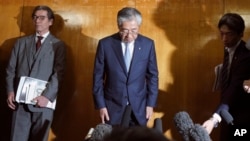The president of the Japanese Olympic Committee is resigning.
Tsunekazu Takeda said on Tuesday he will leave office at the end of his term in June. He also announced plans to resign from the International Olympic Committee.
Takeda denied accusations of corruption against him. French officials placed him under investigation last year for suspected corruption in the city of Tokyo’s effort to hold the 2020 Summer Olympics.
Speaking to reporters Tuesday, Takeda said, “I don’t believe I have done anything illegal.”
The French investigation has had an influence on the way some people look at the Tokyo 2020 Games. Japan is spending at least $20 billion to organize the event, which opens on July 24, 2020.
Tokyo’s Olympics described as the ‘Robot Games’
These Summer Olympics may become known as the “Robot Games.”
Last Friday, organizers showed off robots that will be used to provide assistance for people using wheelchairs. Tokyo Olympic official Masaaki Komiya noted that Japan is known for its robot technology. He said that the 2020 games are a good place to show off.
“Robots should not overwhelm people,” said Komiya, the vice director general to the Tokyo Olympics. “Robots are something that have an amicable relationship with human beings and can work together.”
The robots are products of Toyota Motor Corporation. Toyota officials said that 16 of what they called “human support robots” will be used at the National Stadium. Five other “delivery support robots” will also be available.
At a media event last week, Panasonic Corporation showed off its “power assist” clothing. When worn, the clothes are designed to support the back and help the person wearing them lift heavy objects. Panasonic said 20 of these suits will be used at the Olympics. They could help visitors carrying their belongings and with other lifting duties.
At the Olympics, “people in the world will be able to realize how (ahead) Japan is in terms of robot technology,” said Hideyo Hirata. He is the head of technology services for the Tokyo Olympics.
Yoshifumi Uchida is general manager of Panasonic’s Paralympic department. He said its power assist clothing technology was developed partly because of Japan’s aging population. The clothing could help get more women and older people into the working population.
“When you are carrying a suitcase or a heavy box, this is where (it) becomes valuable,” he said.
He said the suits would also be used away from the Olympic events in “related facilities and airports.”
The suits are powered by batteries. Battery life is about four hours. The clothes gives the wearer the ability to lift about 10 kilograms more with the same amount of energy.
I’m Susan Shand.
The Associated Press reported this story. Susan Shand adapted it for Learning English. The editor was George Grow.
Write to us in the Comments Section or on our Facebook page. _______________________________________________________________
Words in This Story
overwhelm - v. to affect (someone) very strongly
amicable – adj. showing a friendly desire to avoid disagreement and argument
stadium – n. a sports center
department – n. a division of a government or business
facility – n. a building or other object set up to serve a purpose
battery – n. a device that is placed inside a machine (such as a clock, toy, or car) to supply it with electricity








